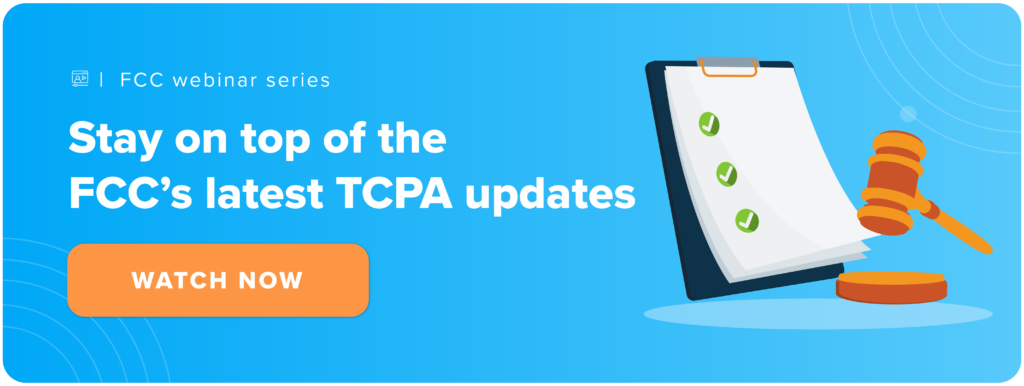What is a robocall? A complete guide for businesses

In today’s digital age, businesses rely heavily on communication technologies to reach their customers and clients. While legitimate calls and text messages play a crucial role in business operations, the rise of robocalls has become a significant nuisance and a growing concern for both businesses and consumers. These automated calls often disrupt daily life and can even lead to fraud and scams.
In this comprehensive guide, we will explore what a robocall is, its nature, purpose, and the legal implications surrounding it. We will also provide valuable insights into how businesses can navigate the latest FCC robocall updates and ensure they stay clear of robocall violations.
What is a robocall?
According to the Federal Communications Commission (FCC): “Robocalls are calls made with an autodialer or that contain a message made with a prerecorded or artificial voice.” These calls can be used for various purposes, including political campaigns, telemarketing, reminders from businesses or organizations, and even scam attempts.
While many uses of robocall technology are for legitimate reasons – such as calls from your doctor’s office, banking and travel alerts, customer service – many are considered nuisances or even illegal, especially if they violate regulations such as the Telephone Consumer Protection Act (TCPA).
What is a robocaller?
Robocallers are the systems or entities that make these automated phone calls.
Robocallers can range from legitimate businesses and organizations conducting lawful communications to illegal operations attempting to defraud or deceive recipients. The term “robocaller” typically refers to the automated system or software responsible for placing the calls rather than the human operators behind them.
What is a robocall used for?
What is the purpose of a robocall? Robocalls have different purposes, depending on the business or organization that is making them. While the TCPA provides some exceptions to the general prohibition on robocalls – such as emergencies involving danger to life or safety – businesses should be aware of the specific purpose for which they may be used.
Robocalls can be used for a variety of purposes, both legitimate and illegitimate:
- Telemarketing: Many businesses use robocalls as a cost-effective way to reach out to potential customers with promotional messages or offers.
- Customer service: Robocalls can be used to provide customer service information such account balance updates or shipping notifications. These types of calls can help businesses improve customer service and reduce the need for customers to call in for information.
- Political campaigns: Robocalls are frequently used by political campaigns to deliver recorded messages to voters, providing information about candidates, urging participation in elections, or soliciting donations.
- Appointment reminders: Some businesses and healthcare providers use robocalls to remind customers or patients of upcoming appointments or important dates.
- Emergency notifications: Public safety agencies may use robocalls to disseminate important information during emergencies, such as natural disasters or public health crises.
- Debt collection: Debt collectors sometimes use robocalls to contact individuals about outstanding debts, though they must comply with regulations like the Fair Debt Collection Practices Act (FDCPA).
- Scams and fraud: Unfortunately, robocalls are also frequently used for illegal activities, such as phishing scams, identity theft schemes, fake IRS calls, and other forms of fraud aimed at tricking recipients into providing personal information or money.
Overall, while robocalls can serve legitimate purposes like disseminating important information efficiently, they are often associated with nuisance calls and fraudulent activities, prompting efforts by regulators and telecommunications companies to combat their misuse.

Common robocall violations
The TCPA establishes strict guidelines for robocall practices, and violations of these rules can result in severe penalties for businesses.
Prior express written consent
One of the most critical guidelines businesses must adhere to is obtaining prior express written consent before making robocalls. Failure to obtain this consent constitutes a violation of the TCPA.
Remember: you are not allowed to make telemarketing robocalls based solely on an “established business relationship” without prior express written consent.
It is also essential for businesses to maintain accurate records of consent to defend themselves against potential TCPA violations.
DNC registry
Another common TCPA violation involves calling numbers listed on the National Do Not Call (DNC) registry or US State DNC registries. These registries provide consumers with a means to opt out of receiving calls, and businesses are legally obligated to consult the DNC list before making robocalls.
Making robocalls to numbers on the DNC registry is a blatant violation of the TCPA unless the consumer has explicitly consented to receive calls from the business.
Timing
Furthermore, the TCPA places restrictions on the timing of robocalls. Businesses are prohibited from making robocalls before 8 AM or after 9 PM in the recipient’s time zone. US States also have additional requirements about calling time and day (holiday) restrictions. It’s imperative for businesses to be cognizant of the time zones of their customers to ensure compliance with these requirements.
Businesses must adhere to the aforementioned restrictions to avoid violations of the TCPA. Penalties for violations can be severe, including significant fines per call and the potential for class-action lawsuits from affected individuals.
Learn more about TCPA consent guidelines here.
Key points of the FCC robocall rules
The latest FCC robocall updates introduce significant changes to enhance consumer protection against unwanted calls and texts. Here are the main points and compliance steps businesses should consider:
Consent requirements
- Prior express written consent: Businesses must obtain prior explicit consent from consumers before making robocalls or sending robotexts. This consent must be clear and specific, detailing the types of communications the consumer agrees to receive.
- One-to-one consent: Approaching January 2025, lead generators and lead buyers will be required to document and retain evidence that each consumer provided prior express written consent to be contacted, rather than relying on single broad or indirect consent.
Revocation of consent
- Multiple methods for revocation: Consumers can revoke their consent through various reasonable methods, such as replying “STOP” to a text or using an opt-out mechanism provided during a call.
- One-time follow up text: Businesses are allowed to send a one-time follow-up text for clarification within 5 minutes after consent has been revoked. However, if the consumer doesn’t engage with this follow-up, businesses are required to stop all communication.
Blocking and monitoring
- Robocall mitigation database: Voice service providers are required to file updated robocall mitigation plans and certify their compliance with the FCC’s guidelines. This includes blocking calls from known bad actors identified by the FCC.
- Text message blocking: Call network providers must block calls and texts from numbers flagged by the FCC as sources of illegal communications.
The latest FCC robocall regulation updates require businesses to review their current practices, update consent collection and verification processes, and ensure timely compliance with consumer opt-out requests.
For some insights into how to navigate the latest FCC robocall changes, check out this blog post.
Gain and store proof of consent with TrustedForm
Businesses can face significant risks if they are not able to provide prior express written consent from consumers to support their outreach campaigns. Lacking this proof can lead to severe legal consequences and damage to the company’s reputation. Therefore, it is crucial for businesses to store and maintain accurate records of consumer consent to make robocalls.
TrustedForm provides independent documentation of consent that can be used for legal compliance. This effective tool simplifies the practice of acquiring, managing, and storing consumer consent by recording exactly when and where consent was provided.
With TrustedForm you can:
- Mitigate TCPA litigation risk by avoiding contacting consumers without documented consent.
- Get instant access to documented consent for proactive compliance auditing checks and legal defense in the event of a complaint including shareable evidence with a Certificate URL.
- View a session replay of the actions taken by the user interacting with the web form.

Certifying leads with TrustedForm is easy as 1-2-3. You just have to:
- Sign up for a free ActiveProspect account.
- Copy the TrustedForm web SDK javascript snippet;
- Paste it to your web forms.
Watch this short video to see how to implement TrustedForm Certify.
Final thoughts
It is crucial for businesses to grasp what is a robocall and to stay informed about the regulations and potential legal repercussions. Robocalls can indeed be a powerful means of communication, but it is paramount for businesses to prioritize adherence to TCPA regulations in order to sidestep the risks of penalties, damage to their reputation, and poor customer experiences.
By securing explicit prior express written consent, offering clear and easily accessible opt-out methods, and respecting the limitations on calls to specific numbers and institutions, businesses can be certain they are employing robocalls in a manner that is both legal and ethical.
And ActiveProspect is here to help you facilitate your consent and record-keeping requirements with TrustedForm.

DISCLAIMER: This page and all related links are provided for general informational and educational purposes only and are not legal advice. ActiveProspect does not warrant or guarantee this information will provide you with legal protection or compliance. Please consult with your legal counsel for legal and compliance advice. You are responsible for using any ActiveProspect Services in a legally compliant manner pursuant to ActiveProspect’s Terms of Service. Any quotes contained herein belong to the person(s) quoted and do not necessarily represent the views and/or opinions of ActiveProspect.





